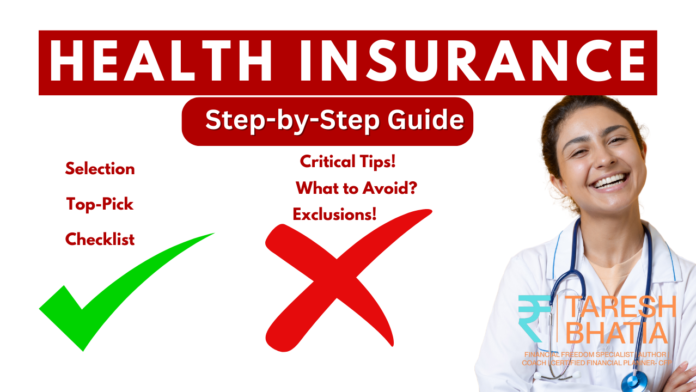Introduction
In today’s fast-paced world, health insurance is no longer a luxury but a necessity. As healthcare costs continue to rise, having a robust health insurance plan is crucial to safeguarding your financial stability and ensuring access to quality medical care when needed. This comprehensive guide is designed to help you navigate the complex world of health insurance in India, especially if you’re purchasing a plan for yourself for the first time. Whether you’re a young professional, a family person, or someone planning for retirement, this guide will provide you with the essential knowledge to make an informed decision.
Why Health Insurance is Essential

Health insurance acts as a financial safety net, covering the costs of medical treatments and hospitalization that could otherwise be a significant burden. With the rising costs of healthcare, even a minor illness can lead to substantial out-of-pocket expenses. Health insurance ensures that you can receive the care you need without depleting your savings. Moreover, it offers peace of mind, knowing that in the event of a serious illness or accident, your financial future is protected.
Assessing Your Healthcare Needs

Before diving into the various health insurance plans available, it’s important to assess your healthcare needs. This involves considering several factors:
- Age and Health Condition: Your age and current health status play a significant role in determining the type of coverage you need. Younger individuals might opt for plans with higher deductibles and lower premiums, while older individuals might prioritize comprehensive coverage.
- Family Medical History: If there is a history of certain illnesses in your family, such as heart disease or diabetes, you may want to choose a plan that provides coverage for those conditions.
- Lifestyle: Your lifestyle choices, such as diet, exercise, and habits like smoking, can influence the type of health insurance you need. Active individuals may require less frequent medical attention, while those with riskier lifestyles may need more comprehensive coverage.
- Location: Healthcare costs and the availability of medical facilities vary by region. If you live in an area with high medical costs, you might need a plan with a higher sum insured.
Understanding Types of Health Insurance Plans

In India, health insurance comes in various forms, each designed to meet different needs:
- Individual Health Insurance: This plan covers only the policyholder. It is ideal for single individuals who do not need to worry about covering family members under the same policy.
- Family Floater Plans: A family floater plan covers all family members under a single sum insured. This is cost-effective if you want to provide coverage for your spouse, children, and yourself. However, the sum insured is shared among all members, which could be a drawback if multiple members require medical attention simultaneously.
- Critical Illness Insurance: This type of policy provides a lump sum payment upon the diagnosis of specified critical illnesses such as cancer, heart attack, or stroke. It is particularly useful for those who want coverage specifically for life-threatening conditions.
- Senior Citizen Health Insurance: Tailored for elderly individuals, these plans typically offer higher coverage limits and include features like no upper age limit for entry and coverage for pre-existing conditions.
- Top-Up and Super Top-Up Plans: These plans provide additional coverage above the threshold limit of your existing health insurance. A top-up plan covers costs after you exceed your base policy’s deductible, while a super top-up plan considers the cumulative medical expenses incurred during the policy year.
Key Factors to Consider When Choosing a Health Insurance Policy

When selecting a health insurance plan, it’s important to consider several key factors to ensure that the policy meets your needs and provides the best value for your money:
- Premium vs. Coverage: While it might be tempting to choose a plan with a low premium, it’s crucial to ensure that the coverage is sufficient for your healthcare needs. Sometimes, plans with low premiums offer limited coverage, which could leave you underinsured.
- Network Hospitals: Check if the insurance provider has a good network of hospitals, particularly those that are easily accessible to you. Cashless hospitalization at network hospitals is a significant advantage as it reduces the financial burden during emergencies.
- Co-payments and Deductibles: Some policies require you to pay a portion of the medical expenses out of pocket, known as a co-payment. Additionally, deductibles are the amount you must pay before the insurance kicks in. Ensure you are comfortable with these terms before purchasing a policy.
- Sum Insured: The sum insured should be sufficient to cover potential medical expenses. In urban areas with higher medical costs, a sum insured of Rs. 10-20 lakhs might be necessary, whereas in rural areas, a lower sum might suffice.
- Coverage for Pre-Existing Conditions: If you have any pre-existing medical conditions, check whether the policy covers them and the waiting period before the coverage starts.
- Maternity Benefits: If you’re planning to start a family, look for a policy that offers maternity benefits, including coverage for delivery and newborn care.
- Claim Settlement Ratio: The claim settlement ratio indicates the percentage of claims settled by the insurance provider. A higher ratio suggests a more reliable and customer-friendly insurer.
- Lifetime Renewability: Opt for a policy that offers lifetime renewability, ensuring that you remain covered even as you age.
- Exclusions and Waiting Periods: Carefully review the policy’s exclusions to understand what is not covered. Also, check the waiting periods for specific conditions and treatments.
Common Pitfalls to Avoid When Buying Health Insurance
Purchasing health insurance can be a daunting task, and many people make mistakes that can cost them in the long run. Here are some common pitfalls to avoid:
- Focusing Solely on Premiums: A low premium might seem attractive, but it often comes with high deductibles, co-payments, or limited coverage. It’s essential to strike a balance between affordable premiums and adequate coverage.
- Not Reading the Fine Print: Always read the policy document thoroughly to understand the terms and conditions, including exclusions, waiting periods, and co-payment clauses.
- Overlooking the Importance of Network Hospitals: Ensure that your preferred hospitals are part of the insurer’s network. This is crucial for availing cashless treatment and reducing out-of-pocket expenses.
- Ignoring Lifetime Renewability: Some policies may not offer lifetime renewability, which could leave you without coverage in your later years when you need it the most.
- Choosing a Plan Based on Agent Recommendations Alone: While insurance agents can provide valuable insights, it’s important to do your research and compare policies independently to ensure you’re getting the best deal.
Tips for Comparing Health Insurance Plans

Comparing health insurance plans can be challenging, given the number of options available. Here are some tips to make the process easier:
- Use Online Comparison Tools: There are several online platforms that allow you to compare different health insurance policies side by side. These tools can help you understand the differences in coverage, premiums, and other key features.
- Consult an Expert: If you’re unsure about which plan to choose, consulting with a certified financial planner or insurance advisor can provide clarity. They can help you understand the nuances of different policies and recommend a plan that suits your needs.
- Consider the Insurer’s Reputation: Research the insurance company’s reputation, particularly its claim settlement ratio and customer service reviews. A reputable insurer with a high claim settlement ratio is more likely to honor claims without hassle.
- Review Policy Features: Compare the features of different policies, including the sum insured, coverage for specific treatments, co-payments, and deductibles. Ensure that the policy you choose offers comprehensive coverage that meets your needs.
- Check for Add-Ons: Some insurers offer add-ons like critical illness cover, maternity benefits, or wellness programs. These can enhance your coverage and provide additional benefits.
Best Practices for Choosing Health Insurance
Here are some best practices to follow when choosing your health insurance policy:
- Check Policy Documents: Always review the policy documents carefully to understand the coverage, exclusions, and claim process.
- Online Research: Use online resources and comparison tools to research different policies and compare their features.
- Claim Illustrations: Pay attention to claim illustrations in the policy documents, which provide examples of how claims are processed.
Best Buy Options for Health Insurance
When choosing a health insurance policy, consider the following features and benefits:
- Worldwide Coverage: Some policies offer worldwide coverage, which is beneficial if you travel frequently or plan to seek treatment abroad. Opt for policies that offer this as a preferred feature.
- Ayush Treatment: If you prefer alternative treatments like Ayurveda or Homeopathy, choose a policy that includes Ayush treatments. This can be particularly useful if you rely on traditional medicine.
- Additional Benefits:
- Animal Vaccine: Coverage for vaccines required for animals, which might be relevant in specific scenarios.
- Organ Donor Coverage: Some policies cover the medical expenses of organ donors, an important feature if you anticipate such a need.
- Free Health Check-ups: Policies offering annual health check-ups, worth around Rs. 1500, are beneficial for maintaining your health.
- Ambulance and Air Transport: Coverage for ambulance services, including air transport, is crucial for emergencies.
- Accident Coverage: Ensure your policy covers accidents, providing a safety net for unexpected injuries.
- E-Consultation: Access to e-consultations can be a convenient feature, especially during times when in-person visits are difficult.
- Discounts on Renewal: Some policies offer discounts on renewal, which can be a cost-saving feature.
- Daily Cash Allowance: This provides a daily allowance during hospitalization, covering incidental expenses.
Waiting Periods in Health Insurance
Understanding the waiting periods in your health insurance policy is crucial, as it determines when you can start claiming benefits for specific conditions:
- 90 Days Normal Waiting Period: Typically, most health insurance policies have a 90-day waiting period for general claims. This means that you cannot file a claim for any non-emergency medical treatments within the first 90 days of the policy.
- Pre-Existing Conditions: For pre-existing conditions, the waiting period can range from 1 to 4 years. Conditions like heart disease may have a longer waiting period before coverage kicks in.
- Specific Illness Waiting Periods: Some policies have a waiting period for slow-growing diseases like ENT (Ear, Nose, Throat issues), hernia, or joint replacement, which could be up to 2 years.
Exclusions in Health Insurance
Every health insurance policy comes with a list of exclusions, which are conditions or treatments not covered by the policy. It’s important to be aware of these exclusions to avoid surprises when filing a claim:
- Day 1 Exclusions: Some treatments or conditions may be excluded from coverage from the first day of the policy. Always ask for a detailed list of exclusions from your insurer.
- Check the Exclusions: Ensure that the exclusions are genuine and not overly restrictive. For instance, routine checkups or non-essential hospitalizations are generally not covered.
- Optional Inclusions: Some exclusions can be covered by paying an additional premium. For example, you can include treatments like Ayush (Ayurveda, Yoga, Naturopathy, Unani, Siddha, and Homeopathy) by opting for a specific add-on.
Understanding the Claim Process

The claim process is a critical aspect of any health insurance policy. It’s important to understand how to file a claim and what to expect during the process:
- Cashless Claims: In the event of hospitalization at a network hospital, you can avail of cashless treatment, where the insurer directly settles the bill with the hospital. To do this, you must inform the insurer in advance (for planned treatments) or within a stipulated time (for emergencies).
- Reimbursement Claims: If you receive treatment at a non-network hospital, you’ll need to pay the bills upfront and then submit a reimbursement claim to the insurer. Ensure you keep all necessary documents, including the hospital bills, discharge summary, and prescriptions.
- Claim Settlement Time: The time taken to settle a claim varies between insurers. While some insurers process claims quickly, others may take longer. It’s important to choose an insurer with a reputation for prompt claim settlement.
- Documentation: Ensure that all required documents are submitted accurately and promptly to avoid delays in claim processing. This includes original bills, prescriptions, diagnostic reports, and the claim form.
- Appealing Denied Claims: If your claim is denied, you have the right to appeal the decision. Review the reasons for denial, gather additional documentation if necessary, and submit a formal appeal to the insurer.
The Role of a Health Insurance Advisor
A health insurance advisor can be invaluable in helping you choose the right policy and navigate the complexities of health insurance. Here’s how an advisor can assist you:
- Needs Assessment: An advisor can assess your healthcare needs and recommend a policy that offers the best coverage for your situation.
- Policy Comparison: Advisors have access to a wide range of insurance products and can help you compare policies from different insurers to find the one that meets your needs.
- Claim Assistance: In the event of a claim, an advisor can guide you through the process, ensuring that you submit the correct documentation and follow the necessary steps to get your claim settled promptly.
- Ongoing Support: Your health insurance needs may change over time, and an advisor can provide ongoing support to ensure that your coverage remains adequate as your circumstances evolve.
- Avoiding Pitfalls: Advisors can help you avoid common pitfalls, such as underinsurance, inadequate coverage, or choosing a policy based solely on premiums.
Choosing the Right Health Insurance Policy: Top Things to Remember

When selecting a health insurance policy, keep the following top considerations in mind to ensure you choose the best plan for your needs:
- Minimum Coverage: Given the rising costs of healthcare, it’s advisable to choose a plan with a minimum coverage of Rs. 5-10 lakhs. This ensures that you’re adequately protected against major medical expenses.
- Network Hospitals: Ensure that the insurer has a good network of hospitals, especially those near your residence. This is crucial for availing cashless treatment and minimizing out-of-pocket expenses.
- No Co-Pay: If possible, opt for a policy with no co-pay clause. This ensures that you don’t have to pay a portion of the medical expenses out of pocket.
- Medical Checkups: Some policies offer free annual medical checkups. This is a valuable benefit that allows you to monitor your health regularly.
- Maternity Benefits: If you’re planning to start a family, look for a policy that includes maternity benefits with a minimal waiting period.
- Claim Settlement Ratio: Choose an insurer with a high claim settlement ratio to ensure that your claims are settled quickly and without hassle.
- Policy Features: Consider additional features such as restoration benefits, no-claim bonuses, and wellness programs. These can enhance your coverage and provide added value.
- Exclusions and Waiting Periods: Carefully review the policy’s exclusions and waiting periods. Understanding these can prevent unpleasant surprises when you need to file a claim.
- Brand Reputation: Opt for a reputable insurer with a strong track record of customer service and claim settlement. A well-known brand is more likely to provide reliable coverage and support.
- Advisor Support: If possible, choose a policy through an advisor who can provide personalized assistance in selecting the right plan, filing claims, and managing your policy over time.
How to Check All These Factors Before Buying Health Insurance
When purchasing a health insurance policy, thorough research and verification of the details are crucial to avoid any unpleasant surprises later. Here’s how you can effectively check the important aspects of your health insurance policy:
1. Check the Policy Document
The policy document is your go-to guide for understanding the coverage, exclusions, and terms of your health insurance. Here’s how to navigate it:
- Read the Entire Document: Don’t just skim through the document. Read it thoroughly to understand all the details, including the terms and conditions. Pay special attention to sections that outline coverage limits, exclusions, and the claims process.
- Understand Key Terminologies: Familiarize yourself with insurance jargon such as “sum insured,” “deductible,” “co-pay,” “exclusions,” and “waiting periods.” Knowing these terms will help you better understand what you’re signing up for.
- Review Exclusions and Waiting Periods: Carefully check the list of exclusions and the waiting periods for various conditions. Ensure that these align with your expectations and healthcare needs. For example, if a policy excludes coverage for pre-existing conditions for a long period, it may not be suitable if you have such conditions.
- Evaluate Coverage Specifics: Make sure you understand what is covered under hospitalization, pre-hospitalization, post-hospitalization, day-care procedures, and any specific illnesses. The fine print will provide clarity on what the insurer will pay for and what you’ll need to cover out of pocket.
- Check for Sub-limits: Some policies impose sub-limits on specific treatments, like cataract surgery or room rent. These limits can significantly affect your claim amount, so be sure to understand them before purchasing the policy.
2. Online Check
In the digital age, online resources are invaluable for researching and comparing health insurance policies:
- Use Online Comparison Tools: Several websites offer tools to compare health insurance policies side by side. These platforms allow you to input your details and preferences to see which plans best match your needs. They also highlight key features, premiums, and exclusions.
- Review Insurer’s Website: Visit the official website of the insurance provider to check the latest policy offerings, terms, and conditions. Download the policy brochures and documents to get the most accurate and updated information.
- Read Customer Reviews: Online reviews can provide insights into the experiences of other policyholders. Look for feedback on the insurer’s claim settlement process, customer service, and overall satisfaction. However, keep in mind that reviews can be subjective, so consider them as one of many factors in your decision-making process.
- Check the Insurer’s Claim Settlement Ratio: This information is often available on insurance comparison websites or the insurer’s website. A higher ratio indicates a better likelihood of your claims being settled without issues.
3. Claim Illustrations Carefully
Claim illustrations are hypothetical examples provided by insurers to demonstrate how a claim would be processed. These are crucial in understanding the practical application of your policy:
- Study Different Scenarios: Look at the claim illustrations provided in the policy documents. These scenarios will show you how much of your medical bills would be covered by the insurance in various situations, such as hospitalization, surgery, or critical illness.
- Understand the Deductible and Co-pay Impact: Claim illustrations help clarify how deductibles and co-payments affect your out-of-pocket expenses. For instance, if your policy has a deductible of Rs. 50,000, you will need to pay this amount before the insurance coverage kicks in.
- Compare with Your Healthcare Needs: Consider how these illustrations relate to your potential medical needs. If the illustrated claims don’t cover a significant portion of expected medical expenses, you might need a policy with higher coverage or fewer restrictions.
- Evaluate Reimbursement vs. Cashless Claims: Some illustrations will show the difference between cashless treatment at a network hospital and reimbursement claims for treatment at a non-network hospital. Understanding this difference is crucial for planning where to seek treatment.
Best Buy Options: Features to Look For in Health Insurance
When choosing a health insurance policy, it’s essential to look for features that offer the best value and comprehensive coverage. Here are the key features to consider:
1. Worldwide Coverage
- Preferred for Frequent Travelers: If you travel frequently, choose a policy that offers worldwide coverage. This ensures that you are protected against medical expenses no matter where you are in the world.
- Emergency Medical Evacuation: Some policies also cover emergency medical evacuation, which is crucial if you need to be transported to another country for treatment.
2. Coverage for Ayush Treatments
- Includes Homeopathy and Other Alternative Treatments: If you prefer traditional or alternative forms of treatment like Ayurveda, Homeopathy, or Siddha, look for a policy that covers Ayush treatments. This can be particularly valuable if you rely on these methods as part of your healthcare regime.
3. Coverage for Animal Vaccine and Organ Donor
- Animal Vaccine: Some policies extend coverage to include vaccines for animals, which might be necessary if you are involved in certain professions or activities where this is relevant.
- Organ Donor Coverage: A comprehensive health insurance plan should cover the medical expenses of an organ donor, providing peace of mind in case you or a family member needs an organ transplant.
4. Free Health Check-Ups
- Annual Check-Ups: Many insurers offer free health check-ups as part of their policy benefits. Typically, these check-ups are worth around Rs. 1500 and help you monitor your health regularly.
- Eligibility: Check the eligibility criteria for these check-ups, such as the number of claim-free years required to avail of this benefit.
5. Ambulance and Air Transport
- Ambulance Coverage: Ensure your policy covers the cost of ambulance services, which can be a significant expense during medical emergencies.
- Air Transport: In critical cases, air transport might be necessary. A policy that covers air ambulance services can be a lifesaver, especially if you live in a remote area or need to be transported to a specialized facility.
6. Accident Coverage
- Inclusion in Basic Policy: Confirm that your policy includes accident coverage, which provides compensation for injuries resulting from accidents, covering hospitalization costs and sometimes even post-hospitalization expenses.
- Separate Accident Policies: You may also consider purchasing a separate accident insurance policy for more extensive coverage.
7. E-Consultation
- Convenience: E-consultation services are becoming increasingly popular, especially in the wake of the COVID-19 pandemic. A policy that includes e-consultations can provide easy access to healthcare from the comfort of your home.
- Network Doctors: Check if the insurer has a network of doctors who offer e-consultations and whether these consultations are covered under the policy.
8. Discounts on Renewal
- Loyalty Discounts: Some insurers offer discounts on renewal as a reward for loyalty or claim-free years. This can significantly reduce your premium costs over time.
- No-Claim Bonus: Look for policies that offer a no-claim bonus, where your sum insured increases for every claim-free year without a corresponding increase in premium.
9. Daily Cash Allowance
- Hospitalization Expenses: A daily cash allowance during hospitalization can help cover incidental expenses that are not included in the hospital bill, such as transportation or meals.
- Eligibility: Ensure you understand the terms for availing this allowance, such as the minimum number of days of hospitalization required.
10. Out-Patient Department (OPD) Coverage
- Pharmacy Costs: OPD coverage typically includes pharmacy expenses, which can add up over time. This is especially useful if you require regular medication.
- Doctor Consultations: OPD benefits also cover the cost of consultations with doctors outside of hospitalization, making it easier to manage ongoing health issues.
- Diagnostic Tests: Coverage for diagnostic tests like blood work, X-rays, or MRIs is another valuable aspect of OPD benefits, reducing your out-of-pocket expenses for regular health monitoring.
11. Specific Illness Cover
- Targeted Coverage: Specific illness cover focuses on certain conditions, like cancer or heart disease, providing a lump sum payment or covering treatment costs beyond the usual scope of the base policy.
- Maternity Benefits: If you plan to start a family, ensure your policy offers maternity benefits, including coverage for delivery and newborn care.
12. Continuity Over Age 60+
- Preferred for Senior Citizens: As you age, your healthcare needs increase. Choose a policy that provides continuity of coverage beyond 60 years of age, ensuring that you are protected as you grow older.
- Lower Premium Increases: Some policies offer lower premium increases or cap them once you reach a certain age, making it more affordable to maintain coverage into your senior years.
Top-Up and Super Top-Up Plans

To enhance your health insurance coverage without significantly increasing premiums, consider top-up and super top-up plans:
1. Top-Up Plans
- Basic Functionality: A top-up plan provides additional coverage once your existing policy’s deductible is exceeded in a single hospitalization event. However, it only activates if the claim amount exceeds the deductible in that one instance.
- Avoid 1-Claim Top-Up: If your top-up plan only covers one claim, it may not be sufficient, especially if you have multiple hospital visits. The scope of coverage in such plans is limited.
2. Super Top-Up Plans
- Preferred for Comprehensive Coverage: Super top-up plans consider the cumulative medical expenses over the policy year, making them a better option for covering multiple hospitalizations or long-term treatments.
- Example Scenario: If your base policy covers Rs. 10 lakhs and you have a super top-up plan of Rs. 30 lakhs with a deductible of Rs. 10 lakhs, any expenses exceeding Rs. 10 lakhs in total during the policy year will be covered by the super top-up plan.
- Deductible Considerations: Ensure the deductible for your super top-up plan matches the sum insured of your base policy. This alignment prevents gaps in coverage.
3. Purchasing from Different Insurers
- Flexibility: You can purchase top-up or super top-up plans from different insurers than your base policy. Just make sure the terms align, especially regarding cashless treatment options.
- Buying at Renewal: Align the purchase or renewal of your top-up or super top-up plans with your base policy renewal to maximize the benefits and ensure continuous coverage.
Add-Ons: What to Avoid and What to Consider

While add-ons can provide valuable extra coverage, not all of them may be necessary for everyone. Here’s what to consider:
1. Maximum Avoid
- Avoid Unnecessary Add-Ons: Some add-ons might seem appealing but offer limited value based on your health needs. For example, if you already have a comprehensive base policy, you might not need additional coverage for minor illnesses.
2. Buy Separate Coverage
- Critical Illness Insurance: Consider purchasing a separate critical illness policy that provides a lump sum upon diagnosis of life-threatening conditions like cancer, stroke, or heart attack.
- Hospital Cash: A separate hospital cash policy offers a daily allowance during hospitalization, helping cover incidental expenses not included in your health insurance.
- Accident Cover: If your base policy does not comprehensively cover accidents, a separate accident insurance policy can provide additional protection.
Final Checklist: Ensuring You’re Covered
Before finalizing your health insurance purchase, use this checklist to ensure that you’ve made the right choice:
- Coverage Adequacy: Ensure that the sum insured is sufficient to cover potential medical expenses, including hospitalization, surgeries, and critical illnesses.
- Hospital Network: Verify that your preferred hospitals are included in the insurer’s network for cashless treatment.
- Policy Features: Review the policy features, including co-payments, deductibles, no-claim bonuses, and restoration benefits, to ensure they meet your needs.
- Exclusions: Carefully read the list of exclusions to understand what is not covered under the policy.
- Claim Process: Familiarize yourself with the claim process, including documentation requirements and timelines for filing claims.
- Advisor Support: If you’ve purchased the policy through an advisor, ensure that they provide ongoing support for policy management and claims.
- Review and Renewal: Plan to review your policy annually to ensure it continues to meet your healthcare needs. Take advantage of renewal discounts and consider upgrading your coverage if necessary.
Conclusion
Navigating the complexities of health insurance can be overwhelming, but with the right knowledge and careful consideration of your needs, you can choose a policy that offers robust protection and peace of mind. From checking policy documents and online reviews to understanding the nuances of top-up plans and add-ons, each step is crucial in ensuring that you get the best possible coverage for your unique situation.
Remember, health insurance is more than just a financial product—it’s a commitment to protecting your health and well-being. By taking the time to research and choose wisely, you can secure a policy that not only meets your needs today but also adapts to your evolving healthcare requirements in the future.
Buying health insurance is a crucial step in securing your financial future and ensuring access to quality healthcare when needed. By understanding your healthcare needs, comparing policies, and avoiding common pitfalls, you can choose a health insurance plan that provides comprehensive coverage and peace of mind. Remember, health insurance is not just a financial product—it’s an investment in your health and well-being. With the right policy, you can focus on living your life without worrying about unexpected medical expenses.
Call to Action:
If you found this guide helpful, be sure to explore other resources on health insurance and financial planning on our blog. At Richness Academy, we’re committed to helping you achieve financial freedom and a fulfilling life through personalized strategies that align with your values and goals. For more insights and expert advice, subscribe to our newsletter and join our community of financially empowered individuals and families.
The author of this article, Taresh Bhatia, is a Certified Financial Planner® and advocate for female empowerment. For more information and personalized financial guidance, please contact taresh@tareshbhatia.com
He has authored an Amazon best seller-“The Richness Principles”. He is the Coach and founder of The Richness Academy, an online coaching courses forum. This article serves educational purposes only and does not constitute financial advice. Consultation with a qualified financial professional is recommended before making any investment decisions. An educational purpose article only and not any advice whatsoever.
©️2025: All Rights Reserved. Taresh Bhatia. Certified Financial Planner®
Subscribe Now for Upcoming Blogs!
[convertkit form=6555951]
📢 Join free live webinar —
Couple Finance Formula™ Register here




